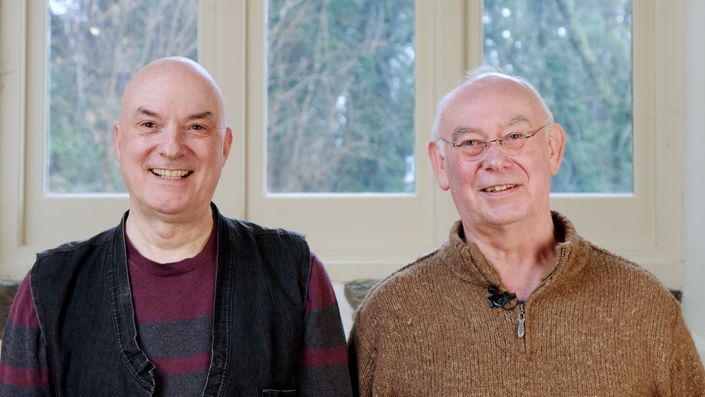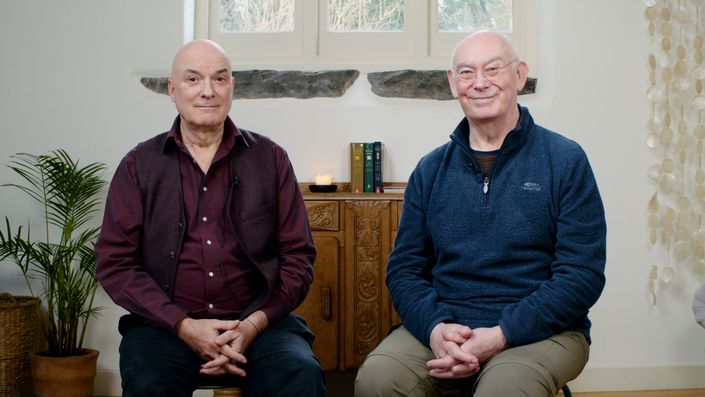Three Doorways to Freedom
A new course with Akincano Weber and John Peacock
Enter into true well-being
This online course will guide you on three contemplative pathways that free the heart and mind
The three characteristics of existence
Impermanence
Unsatisfactoriness
Impersonality
The distortions of mind
Seeing that which is impermanent as permanent
Seeing that which is unsatisfactory as fulfilling
Seeing that which has no essence as me or mine
The three doorways to freedom
Signlessness
Desirelessness
Emptiness

Understanding that frees
Akincano Weber and John Peacock have a passion for uncovering powerful Buddhist teachings that are undertaught and undervalued. Impermanence, unsatisfactoriness, and impersonality are famous in Buddhist circles. What is less often taught is how they actually lead to freedom through the doorways of signlessness, desirelessness, and emptiness.
Enroll and start today.
Live Q&A Sessions
Enroll now to ask questions in two live Q&A Sessions with Akincano and John, hosted on Zoom on the following dates.
- Tuesday, September 2nd at 12pm EDT / 5pm BST / 6 pm CET
- Monday, September 15th at 12pm EDT / 5pm BST / 6 pm CET.
Features and Benefits

Guided meditations
Akincano and John have decades of experience in teaching and guiding meditation students. Each unit begins with settling the mind before an expertly guided meditation takes us further toward freedom.

Stimulating discussions
We each have our own interpretations of the teachings, and Akincano and John are no different. Listen as they work together to understand and clarify the essence of the path, and join the discussion in the forum.

Precision and clarity
The Buddha's teachings are practical and embodied, but we also need precision and clarity. We need to know what we're doing and why. This is where it helps to hear experts who have a good grasp of the concepts they're using.

Unlock key Buddhist concepts
If we want to be clear and precise in our meditation, sometimes it's useful to know a little ancient Buddhist terminology. Whenever such terms are used, we will break them down into easy-to-grasp concepts.

Study with true experts
Akincano Weber and John Peacock are sought-after teachers and scholars of Buddhism. They are founding faculty members of Bodhi College, an educational charity offering contemplative programs for contemporary life.

Everyone is welcome
There is no requirement to have taken any previous course or have prior knowledge of this topic. Three Doorways to Freedom is suitable for engaged beginners and advanced meditators.

Choose a practice that works for you
We all have different temperaments and aptitudes. Some of us may be drawn to noticing impermanence, while others have an intuitive sense of emptiness. For some, there is a wise disenchantment that ripens in desirelessness. This course will help you find the practice that is most effective for you.

Make deeper connections
How exactly does mindfulness of impermanence lead to freedom? This course illuminates the rich tapestry of connections that underpin the Buddhist path. This is crucial knowledge when it comes to guiding our own practice.

Make meaningful progress
Buddhist teachings hold out a promise of radical transformation, of bliss, sublime insight, and durable peace. But somewhere along the way, practice can become a patchwork of comfortable habits. There is more to be realized here.

Participate at your own pace
Go deeper than podcasts and one-off videos. This easy-to-use online course is a six-week program of teaching, discussion, meditation, and inquiry.
Each unit contains around one hour of material to study as well as contemplative exercises. After the course begins, a new unit will be released each Monday. You are free to study at your own pace, and will retain access to the material ongoing.
You can follow the course on a computer, tablet, or phone.
Meditation: Turning the Light Inward
Akincano Weber begins our meditative journey towards the doorways to freedom.
How the Journey Unfolds
This six-unit online course traces a route from where we are to the freedom of nibbana.
Meet the Teachers

Akincano Weber
Akincano M. Weber is a European Buddhist teacher and contemplative psychotherapist (MA). A former monk, he has lived and practiced for twenty years in European and Thai Forest monasteries. Today he is the guiding teacher of Atammaya Cologne, cofounder of Bodhi College and part of several dharma and mindfulness teacher-training programs. He has been teaching meditation and Buddhist psychology in secular and traditional contexts in Europe and overseas for many years and lives with his partner in the Rhineland, Germany.
Akincano has a particular interest in contemplative psychology, the practice of stillness, and the cultural translation of the wisdom teachings of early Buddhism for people of today.

John Peacock
John Peacock is a retired academic and a Buddhist practitioner for over fifty years. He initially trained in the Tibetan Gelugpa tradition in India and subsequently studied Theravada in Sri Lanka. He lectured in philosophy at the University of Manchester, Buddhist Studies at the University of Bristol and finally became co-director of the Masters degree program in Mindfulness-based Cognitive Therapy at the University of Oxford. John has been teaching meditation for over thirty years and continues to research and teach the similarities and differences between early Greek thought and practice, existentialism and early Buddhism. He has a particular focus on ethics within all of these approaches.
Testimonials
Praise for The Good Life, featuring Akincano Weber and John Peacock
This is an extremely well-crafted course, and is deftly presented by weaving the relevance of the material into our daily engaged practice. Both Akincano and John are well-versed in the intricacies and challenges of ethical living, and they make the material wholly approachable by using various facets of Buddhist precepts, concepts, and body-heart-mind qualities. I absolutely recommend this course to anyone who wishes to engage with the world with the highest ethical resonance.
If you would like a little more emphasis on community and social relationships, rather than the individual, in your Buddhist explorations, then these two wise teachers have some really valuable things to say to you.
One of the most enjoyable online courses I’ve taken. It’s still resonating within me.
Course Curriculum
Click the arrow below to see the full curriculum.
- Introduction and Meditation (5:27)
- The Journey to the Doorways of Freedom
- Perceiving, Feeling, Storytelling (24:11)
- How Understanding Leads to Freedom (17:27)
- Check Your Understanding
- Reflect
- Discussion: A Plausible Pathway to Freedom (11:12)
- Meditation 4: Staying at the Level of Process (13:26)
- In Daily Life (4:31)
- Discuss
- Summary
- Introduction and Meditation (9:00)
- Approaching the First of the Doorways (26:09)
- The Freedom of Emptiness (14:32)
- The Doorway of Desirelessness (17:00)
- Check Your Understanding
- Reflect
- Discussion: The Joy of Climbing Mountains (18:45)
- Meditation 5: Being Here, Being Empty, Being Content (12:19)
- In Daily Life (8:55)
- Discuss
- Summary
- Introduction and Meditation (4:44)
- The Trouble with Signs (27:51)
- The Doorway of the Signless (15:00)
- Like Birds in the Sky (11:20)
- Check Your Understanding
- Reflect
- Discussion: Is This Possible? (14:50)
- Meditation 6: A Taste of Signlessness (11:02)
- In Daily Life (6:55)
- Discuss
- Summary
- In Closing (11:38)
- Suggested Reading

About Bodhi College
The purpose of Bodhi College is to develop fresh ways of understanding the dharma today through rediscovering the core insights of early Buddhist teachings. Courses provide a contemplative education that inspires students to realize the values of the dharma (Buddhist teachings) in the context of this secular age and culture.
In the spirit of the Buddha’s teaching, Bodhi College is committed to a middle way of human awakening that integrates theory with practice, encouraging both personal fulfillment and social engagement.
Related courses
You may also be interested in these online courses from Bodhi College and Tricycle.


